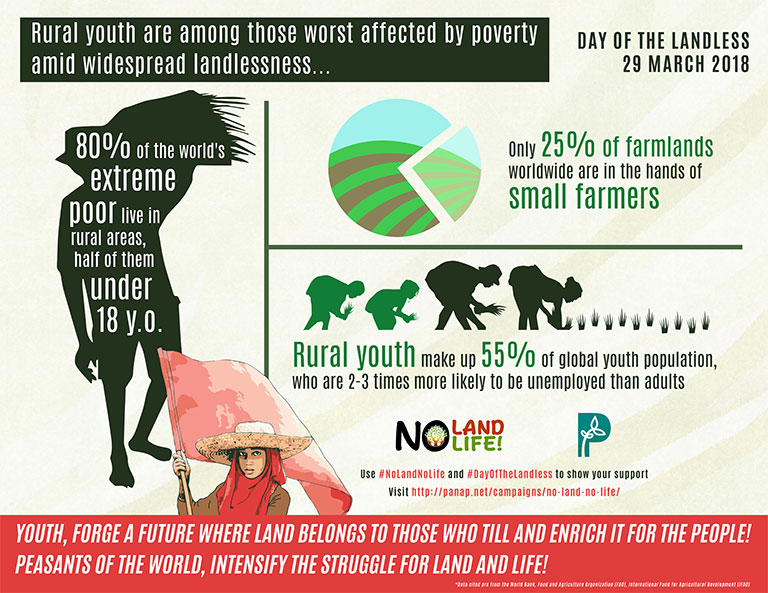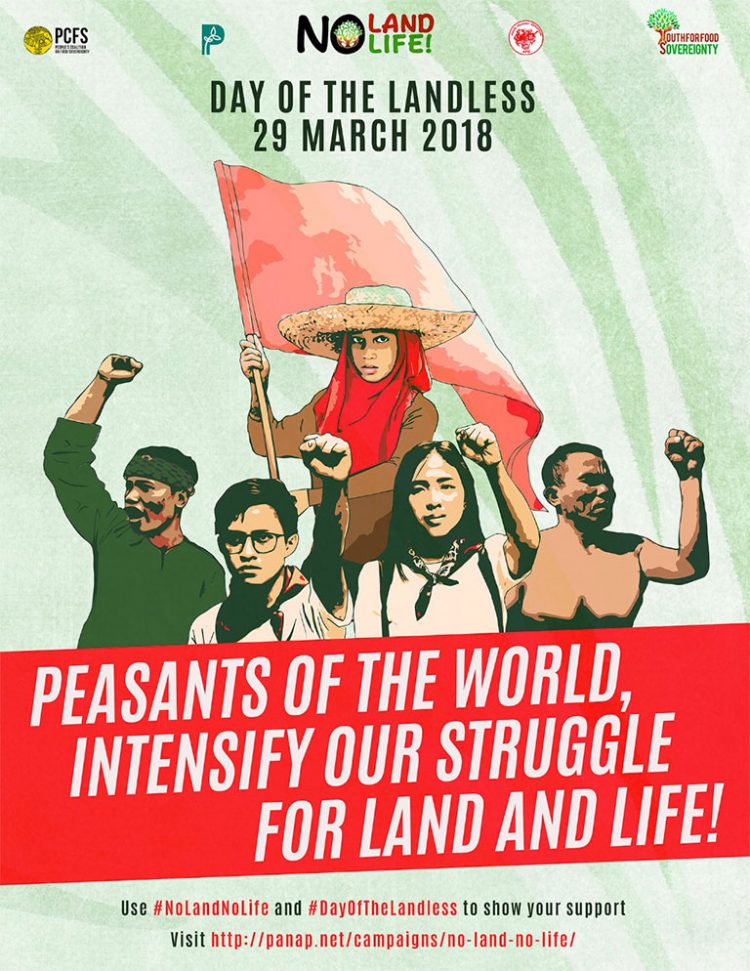#NolandNoLIfe
DAY OF THE LANDLESS 2018

We mark the Day of the Landless this year amid ever pervasive landlessness and land grabbing, driven by the competition of global powers and local elites to control the world’s resources at the expense of small food producers and the food sovereignty of poor countries. This is accompanied by rising militarism and violent repression of rural communities. Among those worst affected by deepening poverty and hunger as well as increasing human rights violations are the rural youth.
But we face these challenges with even greater resolve and optimism as we look forward to the energy and renewed commitment of the youth to help defend the rural people’s right to land and life.
Worsening landlessness
Land is the central aspect of rural life and society. But the increasing commodification of land amid relentless neoliberal onslaught, tightening corporate and monopoly control over agriculture, and the lack of genuine agrarian reform that ensures the people’s right to land and adequately supported by the state, are threatening rural peoples’ access to and control over land and natural resources. Global and regional developments, including the continuing global financial and economic crises and unrelenting push to further liberalize agriculture, the emergence of new economic powers hungry for new markets of surplus capital and products and sources of raw materials, and the rise of fascists and authoritarian governments, are also creating conditions for the ever intensifying unrest and conflicts in the rural areas.
China’s aggressive expansion through its enormous US$890-billion Belt and Road Initiative (BRI), for instance, is dispossessing and displacing farming, fishing, indigenous, and other traditional communities all over the world. The BRI, dubbed as the “only large-scale multilateral development project in the 21st century,” involves 65 countries with 900 ongoing and planned infrastructure projects stretching from the Pacific to western Asia, and all the way to Africa and Europe.
According to the Land Matrix, an independent initiative monitoring land deals, 26.7 million hectares of agricultural land worldwide have been transferred into the hands of foreign investors since 2000. China was able to acquire 2.23 million hectares of them in the period 2000-2014 alone. And this was even before the BRI gained ground.
Meanwhile, multilateral financial institutions such as the Asian Development Bank (ADB) and the World Bank, working with corrupt politicians and foreign investors, continue to fund and implement programs and projects that result in the massive dislocation and marginalization of rural communities. Infrastructure development, including through public-private partnership (PPP), for transportation, energy, and economic zones, among others, are grabbing away or destroying vast tracts of lands and other agricultural resources.
The competition for agricultural land and resources is happening amid the intensified militarism of the world’s powers led by the US. Its pivot to Asia to contain China’s rise has meant, among others, increased support to militaries in the region, long notorious for their human rights atrocities. They have been waging wars and counterinsurgency campaigns that often target rural communities, including those that are embroiled in land conflicts with governments and corporations. This has resulted in increased repression and human rights abuses in the rural areas.
The growing threats to access to and control over land and natural resources not only perpetuate but worsen the vicious cycle of underdevelopment in the rural areas and the poverty and hunger among rural peoples. According to the Food and Agriculture Organization (FAO) of the United Nations (UN), more than 80% of the world’s extreme poor live in the rural areas, and 65% work in agriculture. Around half of those living in extreme poverty are under the age of 18.


The state of the rural youth
The rural youth – which make up 55% of the global youth population – traditionally already suffer from limited access to basic services such as education, health and shelter, as well as to opportunities in terms of livelihood. In general, the youth are two to three times more likely than adults to be unemployed, according to a joint report of the World Bank and International Fund for Agricultural Development (IFAD). Official unemployment rate among the rural youth ranges from 7.5% in Sub-Saharan Africa; Asia, 8.1%; Eastern Europe and Central Asia, 19.7%; Latin America and the Caribbean, 21%; to 22.8% in the Middle East and North Africa.
When the rural youth do find employment, majority are in the informal economy and engaged in household-based and agriculture-related activities such as family workers, subsistence farmers, home-based micro-entrepreneurs, or unskilled workers. They earn very low wages and often face unsafe and exploitative working conditions. Young rural women experience worse, as they also suffer traditional gender-based stereotypes and gender-based division of labor.
The worsening situation of rural communities are forcing the rural youth into labor migration. The youth account for the bulk of migration flows: FAO data shows that 15-34 years old account for one third of all international migrants. The rural youth however, are “most likely to migrate in response to the lack of gainful employment and entrepreneurial opportunities in agriculture and related rural economic activities.”
At the heart of this lack of opportunity to be economically productive is the chronic and prevalent landlessness in the rural areas, made even worse by land and resource grabbing.
Fighting back with a strong youth movement
To defend the right to land and livelihood as well as to protect the way of living of their communities, many young farmers and indigenous people have been at the forefront of the struggle to stop land and resource grabbing, promote food sovereignty and advance genuine agrarian reform. This is despite the intensifying repression of rural communities to pave the way for large-scale corporate agriculture and profit-oriented mega infrastructure projects that saw 166 killed and 342 arrested and detained in the past 14 months due to land conflicts and struggles, including young farmers, farm workers, indigenous people and activists, based on PAN Asia Pacific’s (PANAP) monitoring.
Thus, we welcome with enthusiasm and excitement the first general assembly of the Youth for Food Sovereignty (YFS) on March 30 to April 2. The YFS is an international network of youth organizations that promotes food sovereignty and supports the peasant struggle for genuine agrarian reform as well as the indigenous people’s assertion of their right to their ancestral lands. We strongly support the YFS’s assembly that aims to highlight the plight and struggles of the rural youth, as well as to “enlist the vigor of the youth in the peasants’ intensifying struggle for land and life.”
The future belongs to the youth, and they will help forge today this future where land truly belongs to those who till and enrich the land for the benefit of the people and the planet, and not just for profits of the few.
With the vigor of the youth, we commit to intensify our struggle for land and life!
Endorsed by –
- Asian Peasant Coalition (APC)
- PAN Asia Pacific (PANAP)
- Peoples’ Coalition on Food Sovereignty (PCFS)
- Youth for Food Sovereignty (YFS)
- International League of Peoples’ Struggle (ILPS) Commission No. 6
- Asia Pacific Research Network (APRN)
- Asia Pacific Network for Food Sovereignty (APNFS)
- Asian Rural Women’s Coalition (ARWC)
- People Over Profit (POP)
- GRAIN
- GREEN FOUNDATION
- IBON International
- ALGA, Kyrgyzstan
- Aliansi Gerakan Reforma Agraria (AGRA), Indonesia
- Andra Pradesh Vyavasaya Vruthidarula Union (APVVU), India
- Bangladesh Adivasi Samity
- Bangladesh Bhumiheen Samity
- Bangladesh Kishani Sabha
- Bangladesh Krishok Federation
- Bangladesh Resource Center for Indigenous Knowledge (BARCIK)
- Building Ecological Regenerative Agriculture and Society (BERAS), India
- Cambodia Youth Network (CYN)
- Cambodian Food and Service Workers Federation (CFSWF)
- Center for Environmental Concerns (CEC), Philippines
- Center for Human Rights and Development in Mongolia
- Center for Sustainable Development in Mountainous Areas (CSDM), Vietnam
- Centre for Improved Rural Health and Environmental Protection (CIRHEP), India
- Citizens’ Alliance for Consumer Protection of Korea
- Climate Watch, Thailand
- Coalition of Cambodian Farmers Community (CCFC)
- Coalition of Services of the Elderly, Inc. (COSE), Philippines
- CECODECON, India
- Community Reference Group (CRG), Myanmar
- CREATE, India
- Dharti Development Foundation, Pakistan
- E Consumers, South Korea
- Farmer-Scientist Partnership for Development (MASIPAG), Philippines
- Federation of Free Workers (FFW), Philippines
- Feminist League, Kazakhstan
- Food Sovereignty Alliance, India
- Food Sovereignty Network Nepal
- Forest and Farmers Foundation, Thailand
- Forum of Women’s NGOs, Kyrgyzstan
- Front Mahasiswa Nasional (FMN), Indonesia
- Future Earth, India
- Gabungan Serikat Buruh Indonesia (GSBI)
- GwangJu Local Council, South Korea
- Human Rights Focus Pakistan (HRFP)
- Independent Democracy of Economy Association (IDEA), Cambodia
- Institute for National and Democracy (INDIES), Indonesia
- International Movement of Catholic Agricultural and Rural Youth (MIJARC)
- Khoj Society for People’s Education, Pakistan
- Kilusang Magbubukid ng Pilipinas (KMP), Philippines
- Kudumbam, India
- Low External Input and Sustainable Agriculture (LEISA) Network, India
- Madhya Pradesh Samaj Seva Sanstha, Bhopal (MP FORUM), India
- Nash Vek Public Foundation, Kyrgzstan
- National Federation of Peasant Women (AMIHAN), Philippines
- National Federation of Sugar Workers (NFSW), Philippines
- National Fisheries Solidarity Organization (NAFSO), Sri Lanka
- National Network of Agrarian Reform Advocate (NNARA-Youth), Philippines
- North-East Affected Area Development Society (NEADS), Assam-India
- Pagkakaisa para sa Tunay na Repormang Agrararyo (SENTRA), Philippines
- Pakistan Kissan Mazdoor Tehreek (PKMT)
- PAN Aotearoa New Zealand
- Panalipdan-Mindanao, Philippines
- Pemuda Baru (PEMBARU), Indonesia
- Pesticide Action Network (PAN) – Philippines
- Philippine Network of Food Security Programmes, Inc.
- Ponlok Khmer, Cambodia
- Radanar Ayar Rural Development Association, Myanmar
- RESIST Agrochem TNCs, Philippines
- Roots for Equity, Pakistan
- Rural NGO for the Protection of Women’s Rights, Kyrgyzstan
- SAHANIVASA, India
- SERAC Bangladesh
- Serikat Keluarga Buruh Migrant Indonesia (KABAR BUMI)
- Serikat Perempuan Indonesia (SERUNI)
- SIBAT, Philippines
- SINAGBAYAN, Philippines
- Sining Kadamay, Philippines
- Solidarity House (SH), Cambodia
- Social Work Institute, Nepal
- Sustainable Development Foundation (SDF), Thailand
- Tamil Nadu Women’s Forum (TWNF), India
- Tanggol Bayi (Defend Women), Philippines
- Tenaganita, Malaysia
- Training Education, Development Extention (TEDE) Trust, India
- Unyon ng mga Manggagawa sa Agrikultura (UMA), Philippines
- Vikalpani National Women’s Federation, Sri Lanka
- VOICE, Bangladesh
- We Women Lanka net Work, Sri Lanka
- Women Acting Together for Change (WATCH), Nepal








Discussion about this post